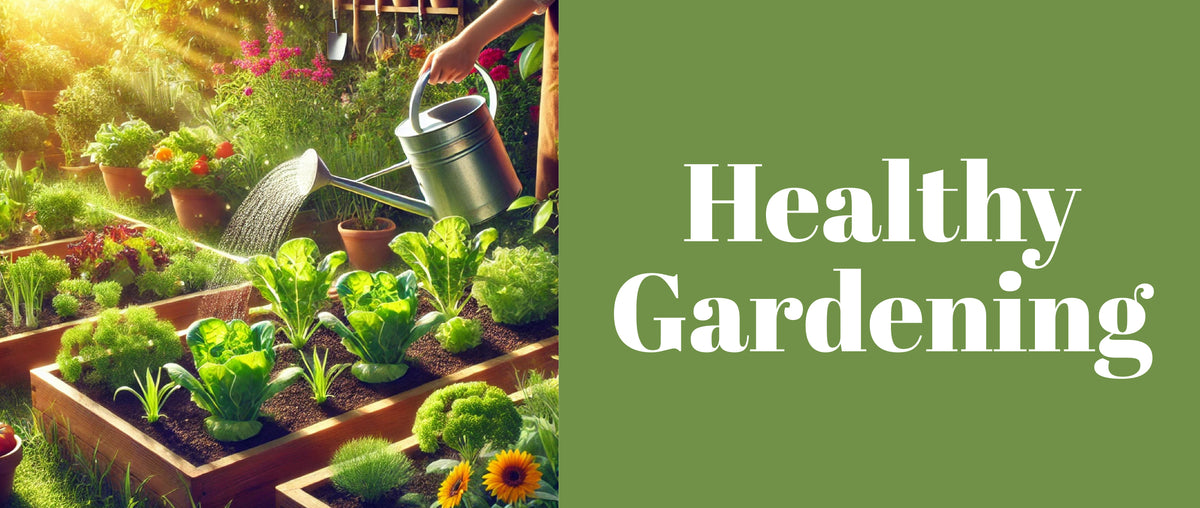Healthy Gardening: How Growing Plants Benefits Your Wellbeing
Gardening is not just a hobby; it’s a holistic approach to improving physical, mental, and emotional health. Over the years, many people have rediscovered the therapeutic benefits of gardening, especially during global events that have forced many of us to spend more time at home. Whether it's tending to your vegetable patch, caring for ornamental plants, or growing herbs for your kitchen, gardening offers a wealth of health benefits that can improve your overall wellbeing.
By incorporating practices such as growing your own plant based foods, you can enhance your lifestyle. This article will delve deep into how gardening helps to promote physical fitness, improve mental health, and even foster social connections, all while highlighting how homegrown foods like plant based cheese and herbs can enhance your diet.

Physical Health Benefits of Gardening
Gardening can be surprisingly physically demanding, making it a perfect alternative to conventional exercise routines. The various activities, such as digging, planting, weeding, and harvesting, engage multiple muscle groups and burn calories. According to a study by the Mayo Clinic, gardening can provide a solid workout similar to low-impact aerobic exercises. Here are a few key physical health benefits of gardening:
1. Full-Body Exercise
Gardening activities involve a wide range of movements like squatting, bending, and lifting. These repetitive motions can significantly improve muscle strength, flexibility, and endurance. For example, digging and shoveling use your back, shoulders, and legs, while activities like planting and weeding engage smaller muscle groups in your hands, arms, and core.
- Squatting while planting improves leg muscles.
- Lifting bags of soil strengthens upper body muscles.
- Pulling weeds enhances hand dexterity and coordination.
Gardening may also help burn a significant number of calories. For instance, you can burn up to 300 calories an hour when engaged in gardening activities. Here’s a comparison table highlighting the calories burned during various gardening tasks:
| Gardening Activity | Calories Burned per Hour |
|---|---|
| Digging | 200-300 |
| Weeding | 150-200 |
| Planting | 120-150 |
| Watering | 80-100 |
2. Cardiovascular Health
The physical exertion involved in gardening activities—such as pushing a wheelbarrow or digging soil—promotes cardiovascular health. Regular engagement in these activities improves heart health, increases stamina, and helps regulate blood pressure.
Mental and Emotional Wellbeing from Gardening
Gardening doesn’t just benefit the body—it’s incredibly soothing for the mind. Spending time outdoors surrounded by plants and nature helps to alleviate stress, boost mood, and even reduce symptoms of anxiety and depression. Let’s explore how gardening can significantly contribute to your mental and emotional health:
1. Stress Relief and Mood Enhancement
One of the key benefits of gardening is its ability to reduce stress. Research shows that simply spending time in green spaces lowers cortisol levels, a hormone linked to stress. Additionally, the rhythmic and repetitive nature of gardening tasks, like weeding or watering, creates a calming effect on the brain.
- Exposure to sunlight while gardening also triggers the release of serotonin, the feel-good hormone, which helps combat depression.
- The physical activity involved in gardening promotes the release of endorphins, further enhancing mood and reducing anxiety.
2. Cognitive Benefits and Improved Memory
Gardening has been found to have a positive impact on cognitive function, particularly among older adults. Studies suggest that engaging in gardening activities stimulates brain function and may slow down the progression of cognitive decline. In fact, a study conducted in Korea demonstrated that patients with dementia experienced improved memory after just 20-minute gardening sessions.
| Cognitive Health Benefits of Gardening | Explanation |
|---|---|
| Improves memory | Gardening engages parts of the brain involved in memory and learning. |
| Stimulates brain activity | Sensory stimulation from plants enhances neural pathways. |
3. A Sense of Accomplishment
Tending to plants and watching them grow can offer a strong sense of accomplishment and purpose. Whether you’re harvesting vegetables or simply witnessing your flowers bloom, the act of nurturing life can boost self-esteem and emotional wellbeing. Plus, the therapeutic process of growing and consuming your own food—like your very own plant based cheese or vegan butter ingredients—makes the entire experience more rewarding.
Nutritional Benefits of Growing Your Own Food
In today’s health-conscious world, more people are turning towards plant based and natural foods. Gardening offers an opportunity to grow fresh, pesticide-free produce that enhances your nutrition. From herbs to fruits and vegetables, having your own garden ensures that you have access to the freshest ingredients for a healthier diet.
1. Fresh, Organic Produce
One of the biggest nutritional benefits of gardening is the ability to grow your own organic fruits and vegetables, which are free from harmful pesticides and additives. Homegrown produce tends to be fresher, more nutrient-rich, and better for the environment.
- Tomatoes are rich in vitamin C and potassium.
- Peppers contain capsaicin, which has anti-inflammatory properties.
- Sweet potatoes provide beta-carotene, an antioxidant that supports skin health.
Incorporating your own garden harvest into your meals can also improve the flavor of your dishes. Whether it's adding mozzarella cheese block to your homegrown tomato salad or creating a delicious pizza with vegan mozzarella cheese, the fresh ingredients from your garden can take your meals to the next level.
| plant based Garden Ingredients | Nutritional Benefits |
|---|---|
| Tomatoes | High in vitamin C and antioxidants |
| Spinach | Boosts immune function |
| Herbs like basil and rosemary | Rich in vitamins and beneficial plant compounds |
Gardening as a Social and Therapeutic Activity
Beyond the individual health benefits, gardening can foster strong social connections and even serve as a form of therapy for those dealing with mental health challenges. Whether through community gardens or family activities, gardening is often an enjoyable way to bring people together.
1. Social Benefits
Community gardens are excellent platforms for social interaction and community building. In these shared spaces, people from different backgrounds come together, exchange gardening tips, and form lasting friendships. Social interactions, in turn, have been shown to reduce feelings of isolation, thereby enhancing mental health.
| Social Benefits of Gardening | Impact on Health |
|---|---|
| Fosters a sense of belonging | Lowers risk of depression and anxiety |
| Provides social support | Helps manage life stressors and difficult times |
2. Gardening Therapy (Horticulture Therapy)
Gardening has increasingly been adopted as a form of therapy. Known as horticulture therapy, this practice uses gardening activities to improve both physical and emotional health. Whether it's through therapeutic gardening sessions for seniors or for those recovering from trauma, the act of nurturing plants provides a calming and healing experience.
Also Read
Growing Your Own Food: A Path to Healthier Eating
One of the most rewarding aspects of gardening is the ability to grow your own food. Whether you're cultivating leafy greens, vegetables, or herbs, gardening allows you to take control of what you consume and embrace a more sustainable, nutritious diet. This can be particularly beneficial for those following a vegan or plant based lifestyle, as it provides a fresh source of produce to complement staples like Vegan Cheese, plant based butter, and cashew butter.
1. Better Nutrition with Homegrown Produce
When you grow your own food, the produce tends to be fresher and richer in nutrients than store-bought alternatives. Vegetables and fruits begin to lose nutrients the moment they're harvested. Therefore, eating directly from your garden ensures that you're consuming the most nutrient-dense foods available. Produce grown in your garden will be:
- Free from pesticides and harmful chemicals.
- Richer in nutrients, especially if harvested at the peak of ripeness.
- Often more flavorful compared to produce that has traveled long distances to reach the store.
For example, tomatoes grown in a home garden have a higher concentration of vitamin C, potassium, and lycopene, an antioxidant linked to reduced risks of certain cancers. Similarly, growing your own spinach can ensure you're getting a fresh, iron-packed addition to your meals.
2. How Gardening Supports a plant based Diet
A plant based diet is centered on foods derived from plants, including vegetables, whole grains, nuts, seeds, legumes, and fruits, and excludes all animal products. Gardening empowers individuals to cultivate the key ingredients needed for vegan dishes at home, leading to a healthier and more environmentally sustainable way of eating.
- Leafy greens, such as kale and spinach, are high in vitamins and essential for a balanced vegan diet.
- Herbs like basil, parsley, and cilantro can elevate any meal while providing antioxidants.
- Homegrown vegetables, such as zucchini and bell peppers, can easily be used to complement store-bought products like mozzarella cheese block or Unsalted Butter.
Additionally, growing your own herbs and vegetables can enhance dishes like plant based pizzas made with mozzarella cheese blocks or Vegan Parmesan Cheese, both of which are staples in many vegan households. Imagine crafting a delicious, plant based pizza topped with your own garden-fresh tomatoes, basil, and store-bought best mozzarella cheese for pizza.
| Homegrown Produce | Nutritional Benefits |
|---|---|
| Tomatoes | High in vitamin C, potassium, and lycopene |
| Kale | Rich in vitamin K, calcium, and iron |
| Spinach | Packed with iron, folate, and vitamin A |
| Herbs (basil, parsley) | Antioxidants, anti-inflammatory properties |
3. Sustainability and Cost Savings
Growing your own produce is not only beneficial to your health but also to the environment. Home gardening reduces your carbon footprint by minimizing the need for packaged, store-bought vegetables that require transportation and plastic waste. Additionally, gardening can be more cost-effective in the long run. A packet of seeds is far cheaper than regularly purchasing vegetables, and the nutritional value of homegrown produce is incomparable.
Gardening also encourages a more sustainable lifestyle. For example, by growing herbs and vegetables to pair with Vegan Products in india like vegan butter or fat-free butter, you're not only improving your health but also reducing your dependence on commercial food production, which often relies on environmentally harmful practices.
Gardening for Vitamin D and Immune Boost
Gardening is a fantastic way to increase your exposure to sunlight, which is a natural source of vitamin D. This essential vitamin plays a critical role in maintaining bone health, immune function, and even mood regulation.
1. Vitamin D and Bone Health
Many people, especially those who spend a lot of time indoors, are deficient in vitamin D. Gardening, especially during the warmer months, provides the perfect opportunity to soak up some natural sunlight. Vitamin D helps the body absorb calcium, which is necessary for maintaining strong bones and preventing conditions like osteoporosis.
- Just 30 minutes in the garden can help you get a healthy dose of vitamin D, improving both bone health and immunity.
- Spending time outdoors also lowers blood pressure and promotes overall wellbeing by exposing you to fresh air and nature.
| Vitamin D Benefits | Gardening’s Role |
|---|---|
| Strengthens bones | Sunlight exposure helps the body absorb calcium |
| Boosts immunity | Supports the immune system by regulating T-cells |
| Enhances mood | Sunlight increases serotonin, improving mental health |
2. Gardening and Immunity
Exposure to sunlight while gardening increases vitamin D levels, which supports the immune system. Research suggests that vitamin D helps regulate the immune system and is critical in defending the body against infections and diseases. Therefore, regularly engaging in gardening can indirectly improve your overall immune health.
Moreover, consuming fresh produce from your garden boosts your intake of essential vitamins and minerals, further enhancing your immune system. Nutrient-rich foods like spinach, kale, and tomatoes are high in antioxidants and immune-boosting properties. These vegetables can be paired with vegan cheese or garlic butter to create delicious, health-enhancing meals.

How Gardening Reduces Stress and Improves Mental Health
Beyond its physical health benefits, gardening is known to have a profound impact on mental health. Numerous studies show that spending time in green spaces and engaging in gardening activities significantly reduces stress, anxiety, and depression.
1. Nature's Impact on Mental Health
Gardening has been shown to lower cortisol levels, the hormone responsible for stress, and increase the production of serotonin, a neurotransmitter that promotes happiness. This combination helps to:
- Reduce anxiety and stress levels, making gardening an excellent activity for those struggling with mental health issues.
- Improve mood and cognitive function, particularly in older adults.
2. Horticultural Therapy
Horticultural therapy, a formal practice that uses gardening to promote mental health, has been found effective for individuals dealing with trauma, depression, and anxiety. It provides a therapeutic outlet that enhances both emotional and physical well-being. Participants in such programs often report an improved sense of purpose, calm, and focus, further boosting their mental health.
Gardening tasks, like planting seeds, watering plants, or tending to a vegetable garden, provide a sense of achievement and purpose. The slow and steady growth of plants mirrors personal progress and growth, creating a profound connection between the gardener and nature.
| Mental Health Benefit | Impact of Gardening |
|---|---|
| Stress reduction | Lowers cortisol levels and improves relaxation |
| Mood enhancement | Boosts serotonin levels, leading to happiness |
| Sense of accomplishment | Provides a rewarding experience |
Conclusion
In summary, gardening offers countless benefits for your physical, mental, and emotional well-being. Not only does it provide a fantastic form of exercise, but it also boosts your immune system, improves cognitive function, and enhances your mental health. Growing your own plant based food, like vegetables for salads paired with vegan mozzarella cheese or Garlic Butter, ensures that you're consuming nutrient-rich, pesticide-free produce.
Gardening allows you to live a healthier, more sustainable lifestyle while enjoying the therapeutic benefits of nurturing your own plants. Whether you're growing your own herbs for a pizza topped with the best mozzarella cheese in India or experimenting with fresh Cashew Butter and Unprocessed Cheese, your garden can be the key to healthier eating and improved well-being.
Now is the time to start your own garden, enjoy the numerous health benefits, and experience the joy of growing your own food.
Do you enjoy vegan food? We have a list of vegan restaurants in India to help you find delicious options in your area!










